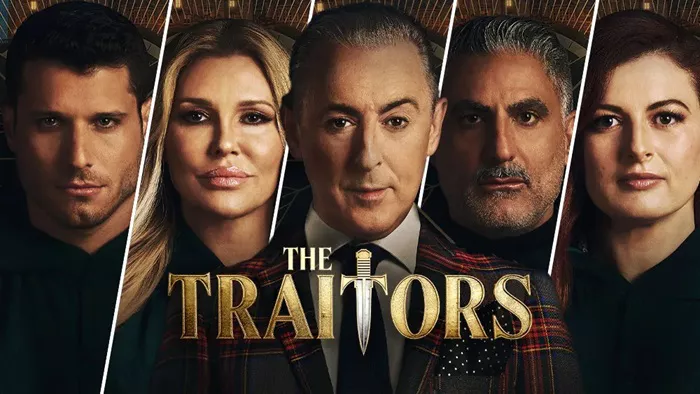The television landscape has always been ripe with espionage thrillers, offering audiences a peek into the clandestine world of spies, double agents, and high-stakes political maneuvering. Among the myriad of shows in this genre, “Traitors” stands out as a riveting drama that delves into the post-World War II era and the treacherous underbelly of espionage. This article aims to explore and dissect the essence of the “Traitors” TV show, examining its plot, characters, themes, and the critical reception that has surrounded it.
Premise and Setting
Set in London in the aftermath of World War II, “Traitors” follows the story of Feef Symonds, a young woman who finds herself embroiled in a web of espionage and betrayal. The show navigates the intricate political landscape of the late 1940s, where the British government, reeling from the effects of the war, is grappling with the emergence of a new global superpower, the United States, and the looming threat of the Soviet Union.
Plot Overview
The series opens with Feef Symonds, played by Emma Appleton, working as a civil servant in the British Ministry of Information. Her life takes an unexpected turn when she is approached by an American agent, Rowe, portrayed by Michael Stuhlbarg, who recruits her as a spy to gather information on her own government. As Feef gets deeper into her double life, she finds herself torn between her loyalty to her country and her allegiance to Rowe and the American cause.
The narrative of “Traitors” unfolds in a cat-and-mouse game of espionage, where allegiances are constantly shifting, and no character can be taken at face value. Feef navigates a treacherous world where secrets abound, and every decision she makes carries weighty consequences.
Character Dynamics
At the heart of “Traitors” lies the character of Feef Symonds, a young and impressionable woman thrown into the world of espionage. Emma Appleton’s portrayal of Feef is nuanced and compelling, capturing the inner conflict of a woman torn between her patriotic duty and the allure of a thrilling but perilous life as a spy. Feef’s journey is fraught with moral dilemmas and personal sacrifices as she grapples with the consequences of her actions.
Supporting characters in “Traitors” are equally intriguing, each with their own motives and agendas. Michael Stuhlbarg’s Rowe embodies the enigmatic American agent, blurring the lines between mentor and manipulator. Additionally, characters like Hugh Fenton (played by Luke Treadaway) and Priscilla Garrick (Keeley Hawes) add depth to the narrative, weaving their own intricate subplots into the overarching story of espionage and betrayal.
Themes Explored
Beyond its cloak-and-dagger intrigue, “Traitors” touches upon several themes that resonate with the audience. One prominent theme is the exploration of loyalty and betrayal, as Feef struggles to reconcile her allegiance to her country with the clandestine work she undertakes for the Americans. The show also delves into the consequences of one’s choices, highlighting the far-reaching impact of decisions made in the shadows of espionage.
Moreover, “Traitors” examines the shifting geopolitical landscape of post-war Europe, where the world powers vie for supremacy and ideological differences heighten tensions. The series provides a glimpse into the paranoia and uncertainty that prevailed during the early days of the Cold War, capturing the atmosphere of mistrust and suspicion that permeated society.
Critical Reception
Upon its release, “Traitors” garnered praise for its gripping storyline, taut pacing, and compelling performances. Critics lauded the show for its ability to keep viewers on the edge of their seats, seamlessly blending historical drama with espionage thrills. Emma Appleton’s portrayal of Feef Symonds received widespread acclaim for its depth and vulnerability, anchoring the series with a strong central performance.
The series was commended for its attention to historical detail, capturing the ambiance of post-war London and the political tensions of the era. The intricate plot twists and morally complex characters contributed to the show’s appeal, earning it a dedicated fanbase and positive reviews from both viewers and critics alike.
However, while “Traitors” received acclaim for its storytelling and performances, some critics highlighted pacing issues in certain episodes, noting occasional narrative lulls that detracted from the overall momentum of the series. Despite these criticisms, the show maintained its intrigue and captivated audiences with its suspenseful narrative.
Legacy and Impact
“Traitors” made a mark in the realm of espionage dramas, carving a niche for itself among the plethora of shows in the genre. Its exploration of the morally ambiguous world of spies and the complex interplay of loyalties resonated with viewers, leaving a lasting impression.
The series sparked discussions about the nature of patriotism, the sacrifices individuals make for their beliefs, and the enduring relevance of espionage in an ever-evolving geopolitical landscape. Furthermore, “Traitors” added to the ongoing fascination with historical dramas, drawing attention to lesser-explored periods and the intricacies of post-war politics.
Conclusion
In conclusion, “Traitors” stands as a captivating and thought-provoking addition to the world of espionage television dramas. With its compelling storyline, well-drawn characters, and exploration of pertinent themes, the show managed to enthrall audiences and critics alike. Through its portrayal of the post-World War II era and the morally murky world of espionage, “Traitors” left a lasting impact, solidifying its place as a memorable and engaging series in the realm of television storytelling.
























